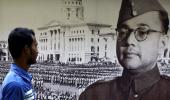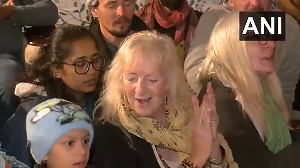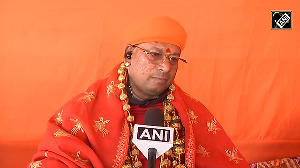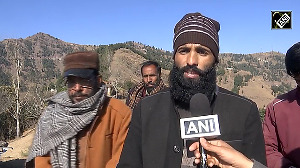As the country commemorates Netaji Subhas Chandra Bose's 125th birth anniversary, the Forward Bloc, which had in 1939 emerged as a faction of the Indian National Congress under his leadership, struggles for political survival, having been plagued by financial crisis, numerous splits and lack of management.
 IMAGE: Prime Minister Narendra Modi tweeted this picture as a tribute to Netaji Subhas Chandra Bose on his 125th birth anniversary, January 23, 2022. Photograph: ANI Photo
IMAGE: Prime Minister Narendra Modi tweeted this picture as a tribute to Netaji Subhas Chandra Bose on his 125th birth anniversary, January 23, 2022. Photograph: ANI Photo
>The organisation, riding on Netaji's influence on the masses, had established its electoral presence post-Independence in states such as Tamil Nadu, Andhra Pradesh, Kerala and Assam, with West Bengal being its main stronghold, but eight decades down the line, the party, now limited to just some pockets of the country, has no MP or MLA in its kitty.
Although the present leadership is mulling a revival strategy, lack of resources and the Forward Bloc's role in playing second fiddle to the Communist Party of India-Marxist with no independent identity of its own is proving to be the biggest roadblock for the party.
"It is true that we are facing a deep crisis. There was a period post-independence when we had our MLAs in Maharashtra, Bihar, states of southern India and West Bengal. Now we don't have a single MP or MLA representing our party. The membership count, too, has dwindled over the years. We are now discussing a revival strategy," AIFB general secretary Debabrata Biswas told PTI.
Apart from Netaji, the party also boasts of having several stalwart leaders as its members, including including H V Kamath, Hemanta Basu, RS Ruiker, S B Yagee and SS Kavishar among others.
Biswas pointed out that multiple splits and exodus of stalwart leaders to other parties are the two major reasons for the Forward Bloc's downfall.
"Post-independence, we had many stalwart leaders who not just helped the party grow but also provided leadership in the absence of Netaji. However, the glue to hold together everybody went missing after Netaji was gone. Starting 1948, the party faced several splits, first between Ruikar and the Yangee group, and then in several other states.
"Plus, many leaders openly advocated the merging of Forward Bloc with the Congress, with some of them later joining the Congress or other political outfits. The death of senior leaders also led to a huge void that we failed to fill up," he said.
History suggests that Bose, after resigning from the post of Congress president on April 1939, had decided to form a bloc within the party to consolidate Left and socialist-minded leaders under one platform.
Bose was elected as its first president and H V Kamath as its general secretary.
The party was later renamed as All India Forward Bloc -- a socialist, political organisation.
Over the years, the AIFB became a constituent of the CPI-M-led Left Front, losing its independent identity.
Its vote share in national politics dipped from 0.35 per cent in 2004 to 0.05 per cent in 2019 Lok Sabha elections.
In Bengal, the slide was sharper -- from 4.80 per cent in 2011 to 0.53 per cent in the 2021 assembly polls.
Currently, the AIFB has just a handful of panchayat members in some of the pockets of West Bengal.
The party leadership pointed out that failure to groom the next-generation leaders and draw youth to the organisation are also prime reasons for its present existential crisis.
"After death or exodus of senior leaders, we failed to groom young cadres. Although there is a lot of respect and curiosity about Netaji's life and struggle among youth, we failed to bring them into the party fold. On top of that, confusion on whether to follow Subhaswad (ideology of Netaji) or Left ideology has alienated a section of people. No doubt he was a Leftist, but he preached the ideology of samyavad -- the doctrine of synthesis or equality," Biswas said.
Echoing him, AIFB state secretary Naren Chatterjee said lack of financial support has also aggravated the woes.
"In present-day India, if you want to gain foothold in politics, you need money. After the Left Front lost power in 2011, our finances were badly hit. We are now running the party based on levy collected from members, party subscriptions and donations by party sympathisers. But that's not enough. If we want to strengthen the party, we need money," he said.
Speaking about the party's revival plan, Biswas said talks are underway for an organisational overhaul with special thrust on Netaji's policy of inclusiveness and samyavad.
"The AIFB is viewed as a partner of the Left Front. Talks are one to change the party's constitution, its policies in accordance with the vision of Netaji. There will be Left unity, but we will have a separate identity that Netaji admirers across the country would identify with," he said.
However, members of Netaji's family feel it would be a challenging task for the Forward Bloc to revive the organisation in the present political scenario, where the CPI-M itself is struggling to stay relevant.
"The Forward Bloc over the years became a second fiddle to the CPI-M. And now, with CPI-M itself in the lurch, things are tougher for the Forward Bloc. The present-day Forward Bloc is a modified version of what Netaji had formed," the freedom fighter's grandnephew Chandra Kumar Bose, who was associated with the party for a decade, told PTI.
Netaji was a proponent of a Left ideology that was rooted to ground realities in the country, he did not blindly follow other communist nations, Chandra Kumar Bose said.
Sugata Bose, another grandnephew of Netaji and an eminent historian, said the Forward Bloc of the post-independence period has very little to do with Netaji and his ideals.
"He left the Forward Bloc, formed INA, and fought for India's independence.It is a mistake to equate the fringe political party with what Netaji had formed in 1939. His ideals are above politics," Bose, also the chairman of Netaji Research Bureau, said.
Political pundits feel the Forward Bloc is a spent force in West Bengal, and its resurrection would be an arduous task.
"Post 2011, most Forward Bloc leaders joined the TMC in West Bengal. Just like it failed to keep its flock together across West Bengal, the same happened elsewhere. Its revival would be a tough task, and seems unlikely anytime soon," political analyst Biswanath Chakraborty said.











 © 2025
© 2025